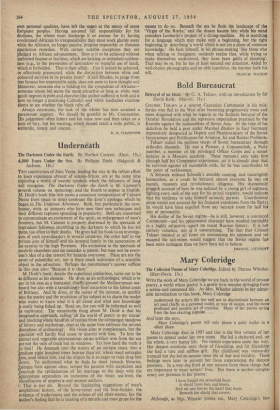Underneath
The Darkness Under the Earth. By Norbert Casteret. (Dent. 15s.)
4,000 Years Under the Sea. By Philippe Diole. (Sidgwick & Jackson. 18s.)
Two countrymen of Jules Verne, leading the way in the robust effort to keep experience abreast of science-fiction, are at the same time exploring a world of womby symbols which the followers of Jung will recognise. The Darkness Under the Earth is M. Casteret's venth volume on speleology, and the fourth to appear in English.
. Dioles book (the title seems a conscious transposition of Captain emo from space to time) continues the diver's apologia which he
gan in The Undersea Adventure. Both, but particularly the cave- unter, write as pioneers who have seen their new techniques and their different raptures spreading in popularity. Both are concerned to communicate an excitement of the spirit, an enlargement of man's frontiers, but M. Casteret is properly distressed by the spectacle of mprudent followers stumbling in the darkness to which he has led em, too often to their deaths. He gives half his book to an investiga- . 'on of such cave-disasters in several countries, the other half to the rivate joys of himself and his intrepid family in the penetration of cc-caverns in the high Pyrenees. His exultation in the spectacle of Oorch-lit chambers and ire cascades is patent, but may not be every. ne's idea of a due reward for hazards overcome. These are not the caves of paleolithic art, nor is there much indication of a scientific Abject in the adventure. Perhaps the mountaineer's answer suffices in this case also: 'Because it is there.'
, M. Diole's book; despite the superficial similarities, turns out to be as different as his element. He dives as an archwologist, which is to say in his case as a humanist, chiefly. around the Mediterranean sea- board but also with a tantalisingly brief excursion to the fabled coast Of Brittany. And he dives, at the outset of the account, so quickly into the poetry and the mysticism of his subject as to alarm the reader Who wants to know what it is all about and what new knowledge Is really being fished up. Read on, for you will be informed as well s captivated. The remarkable thing about M. Diole is that his aginative approach, calling 'all the world of poetry to my rescue' and plucking whole handfuls of rarities from the submerged meadows Of history and mythology, does at the same time embrace the serious disciplines of archmology. His vision aims at completeness, but the specialist will hardly find cause to quarrel with him. To him the animal and vegetable encrustations on an artifact won from the sea e not the veils of truth but its windows. Yet how hard the truth is o find! He descends into the waters of an antique coast, into a edium eight hundred times heavier than air, where weed entangles im, mud blinds him, and the objects he is so eager to raise drag him own. To understand what he finds he must ransack libraries, alaace facts against ideas, temper his passion with scepticism and nchide the epithalamion of his marriage to the deep with the ppropriate appendices on variations of the mean sea-level, the 'classification of amphora; and ancient anchors.
1,1 That is not all. Beyond the fascinating suggestions of man's amphibious history, of the horse-tamer and the boat-builder, the
evidence of trade-routes and the echoes of old place-names, lies the author's feeling that he is treating of a miracle and must grope for the
means to do so. Beneath the sea he finds the landscape of the 'Virgin of the Rocks,' and the dream haunts him while his mind considers Leonardo's project of a diving-machine. He is searching for a language which may make only a beginning, but the right beginning, in describing 'a world which is not yet a place of common knowledge.' He feels himself, in his phrase-making 'like those who when talking to foreigners, suddenly realise that, while trying to make themselves understood, they have been guilty of shouting'. That may be so, but he has at least secured our attention. Aided by well-chosen photographs and an able translator, the mariner hath his


































 Previous page
Previous page